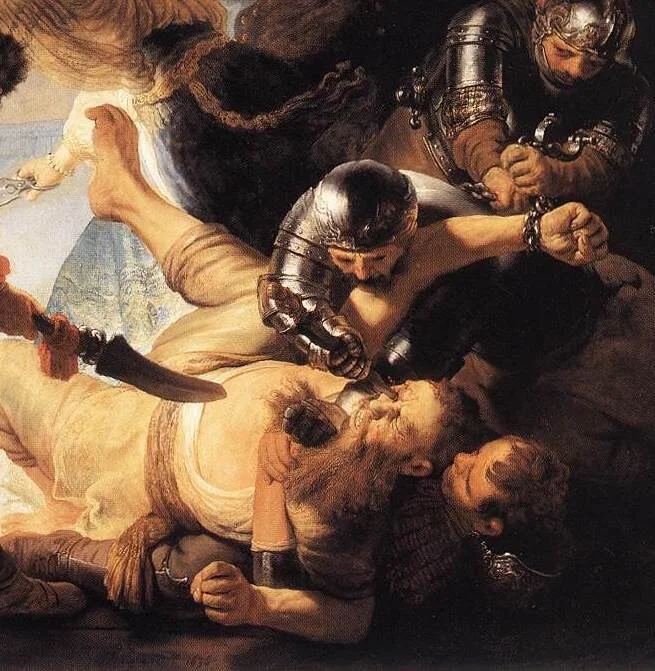Lent Series: Judges -- Deborah
This Lent, we look back and reflect on the Judges of pre-monarchic Israel. In this first post of the series, Fr Peter focuses on Deborah and her song.
Judges 4.4-16
The Book of Judges describes a period long in Israel’s past, which acts as a bridge between the narratives of Exodus and the conquest and settlement of Canaan on the one hand, and the history of the monarchies of ancient Israel and Judah on the other. There are twelve characters in the book who, we are told, judged Israel, most of whose names we would not now recall, but a few of whom – Deborah, Gideon, Samson, Jephthah – live more easily in our memories because of the stories and songs associated with them.
Deborah is, of course, the only woman in the list, and the only woman described as ruling God’s people during the long period of the Old Testament narratives. She is a prophetess, who used to sit under a date palm tree, and the people of Israel come to her for judgement. It’s hard to know exactly what this means, but the sense seems to be that the various tribes that we later call the twelve tribes of Israel acknowledged certain leaders as having the authority to advise the people as a whole, and to issue judgement in matters of dispute. We see Deborah channelling the word of the Lord, and maintaining the wisdom which is her particular gift in the face of the ambivalence and uncertainty of others, and especially of the general Barak, whom she sends into battle.
Barak’s opponent in Sisera, general of the Canaanite army. Deborah gives Barak the Lord’s instruction, but in one of the more bizarre examples of male weakness in the Bible, Barak is willing to go only if Deborah comes with him. The command of the Lord is not enough, but if the prophet is holding his hand, he thinks he will be OK. In the subsequent chapter, Deborah is called a mother in Israel, a description which seems entirely apt at least as far as Barak is concerned. Deborah’s response to Barak’s hesitation is to warn him that the glory will not be his, but will fall to a woman. This is dramatic irony for the reader, who probably knows the story of Sisera’s seduction and death at the hands of Jael. The glory falls to Jael who overcomes Israel’s enemy, but it also falls to Deborah who leads her people through the crisis.
The following chapter contains what we call the Song of Deborah, thought by many scholars to be among the oldest passages in the Bible, dating back as far perhaps as the eleventh or twelfth century before Christ. It tells of Israel in its need, of Deborah’s response to that need, and of the victory of the Israelite tribes. It goes on to sing of the heroism of Jael, and to triumph in song over Sisera and his people.
That is all we have of Deborah in the Book of Judges. What do we take from her as we focus our prayers this Lent and meditate upon the coming passion of Christ? First of all, I think, we take an example of faith, and the consequences of that faith. The contrast between Deborah and those around her is marked. She waits upon the Lord, she receives his word and instruction, and she acts accordingly. She needs no further assurance than her knowledge of God’s will. It is an enviable position. More often than not, we will be more like Barak than like Deborah, wanting reassurance and craving certainty before we take the risk of doing the will of God. But we also take from Deborah the idea, so important in so much of the Old Testament, that true wisdom and discernment belongs with the Lord and not with our own preconceptions. Deborah does not sit under a palm tree in order to sunbathe. She seeks the solitude and the silence which will allow her to pray, which enable the openness to God which she needs in order to fulfil her function and her calling on behalf of her people. In order to serve others, she needs first of all to focus on the Lord.
During Lent, we undertake the discipline of self-examination in order better to know ourselves, but ultimately in order better to know the will of God. The will of God and the love of God are one and the same, of course, but the will of God is not for our benefit, if by that we mean something private between ourselves and the Almighty. Trying to discern the truth, trying to do God’s will must always mean trying to serve, to serve ourselves by growing closer to that divine love, but also to serve others by living out that love in the things we do and say. Deborah is an imposing example of faith in the ancient world of tribes and generals and gods, but she is also a signpost of wisdom and of discernment for any who would try to follow in the way. And that way, this and every Lent, is the Way of the Cross.





